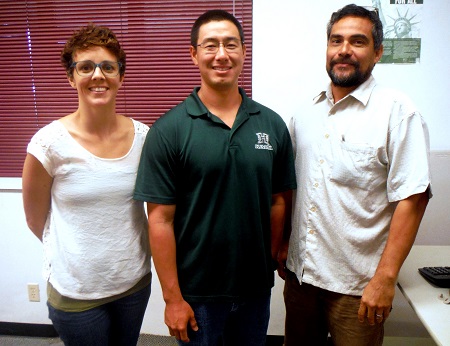
Mr. Jensen Uyeda (center) of the UH Manoa College of Tropical Agriculture was a recent guest of ASCC-ACNR. Uyeda, who gave a series of workshops on topics of interest to local agriculture professionals, is seen here with Dr. Ian Gurr (right) of ACNR, and Beth Gurr, manager of the American Samoa Community Hydroponics Development Project. (Photo: J. Kneubuhl)

Mr. Jensen Uyeda (center) of the UH Manoa College of Tropical Agriculture was a recent guest of ASCC-ACNR. Uyeda, who gave a series of workshops on topics of interest to local agriculture professionals, is seen here with Dr. Ian Gurr (right) of ACNR, and Beth Gurr, manager of the American Samoa Community Hydroponics Development Project. (Photo: J. Kneubuhl)
UH Agriculture Extension Agent Gives ASCC-ACNR Workshop
June 21, 2016
By James Kneubuhl, ASCC Press Officer
Mr. Jensen Uyeda, an Agriculture Extension Agent specializing in Edible Crops at the University of Hawaii at Manoa College of Tropical Agriculture & Human Resources led a series of workshops in mid-June at the Agriculture, Community and Natural Resources (ACNR) division of the American Samoa Community College (ASCC). ASCC-ACNR invited Uyeda to American Samoa to conduct a Western Sustainable Agriculture Research and Education (WSARE) Professional Development Program Workshop. Funded by WSARE, the workshop attracted an audience of agricultural professionals, nonprofit organizations involved in agriculture, and farmers.
“Samoa is in the same boat as Hawaii in that we are both isolated and have very limited natural resources, which makes food production very challenging to do locally,” observed Uyeda, of the “agroprofessional” trainings he conducted. “This is mostly due to the need to import everything from fertilizer to animal feed and seeds.” Over the course of two days, Uyeda shared his knowledge on topics including Irrigation Management; Hydroponic Farming Systems; Integrated Pest Management; Good Agricultural Practices & the Food Safety Modernization Act; and Crop Selection/ Conducting Variety Trials.
“The main goal was professional development for our agriculture professionals, such as agriculture extension agents and researchers, Natural Resources Conservation Services (NRCS) staff, non-profit organizations conducting agriculture related projects, and farmers,” explained Dr. Ian Gurr of ASCC-ACNR. “The workshops focused on topics that would benefit our local agriculture professionals, who can use the training they received to assist farmers in improving production while also protecting the environment. The farmers who attended the workshop were able to request that Mr. Uyeda visit their farms, where he answered questions, observed their operations and made recommendations.”
In addition to the two days of workshops at ASCC-ACNR, Uyeda also visited local hydroponic farms, where he answered questions and made suggestions for improvements. Among these were farms participating in the American Samoa Community Hydroponics Development Project, a three-year project venture by US Department of Agriculture through the local non-profit Pacific Youth and Community Development (PYCD). “We are currently training five new farmers in hydroponic techniques, and three of them were in attendance at the workshops,” said project manager Brooke Gurr. “Jensen also visited with one of our mentor farmers, Larry Hirata, at Hirata HydroGardens,” continued Gurr, “and discussed building greenhouses with some locally available resources instead of purchasing expensive hoop-house designed structures from off island. He also talked with Teleia Semi Puni, a participant in the training, about understanding pH and how it can affect crops in a hydroponic system.”
Uyeda said that while the workshops proved rewarding, getting to know local farmers also proved a highlight of his time here. “The most interesting activity was visiting the farms around the Island and being able to see how food is being grown,” he said. “American Samoa is a beautiful island that has great potential for food production.” When asked if he could think of any crop not currently being grown that could thrive in the Territory, he observed, “I think that citrus production, mainly limes, might do well and could be sold to the mainland US since in Hawaii most of the limes are imported from Mexico. This may be profitable in the future if Mexico is hit heavy with the HLB bacterium and cannot produce limes for export.”
Before returning to Hawaii, Uyeda expressed interest in working again with local agriculture professionals. “I hope that Hawaii and American Samoa can continue to collaborate on projects and educational events in the future to further advance both of our agricultural industries,” he said. For more information on ASCC-ACNR services to local farmers, contact Dr. Ian Gurr at 699-1575.
